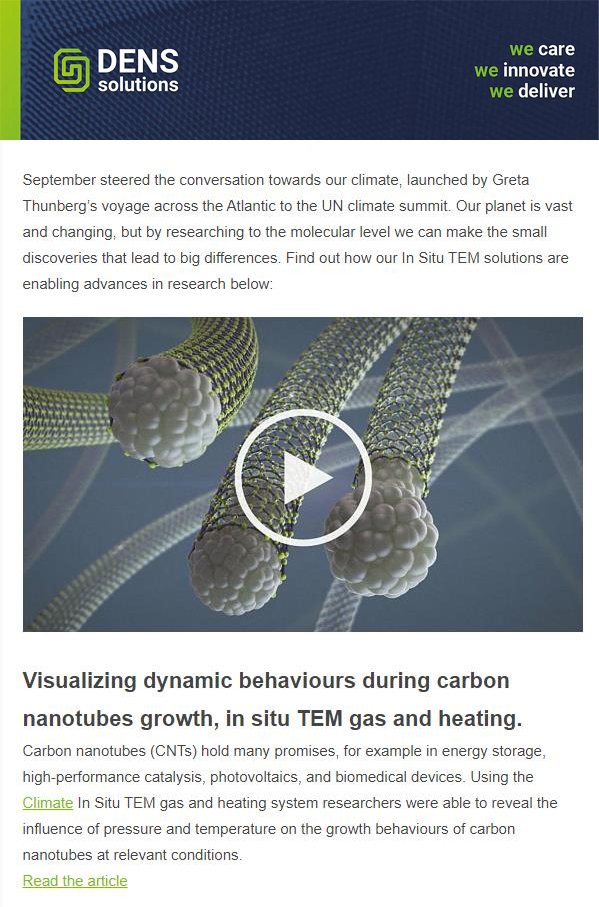
From left to right: Oliver Mchugh and Dr. Thomas Slater from Cardiff University, Dr. Lars van der Wal and Alex Rozene from DENSsolutions
We are excited to announce that DENSsolutions has installed both a Stream and Climate system at the renowned Cardiff University in Wales, the United Kingdom. In this article, we interview Dr. Thomas Slater, Lecturer at Cardiff University, to learn more about the Cardiff Catalysis Institute Electron Microscope Facility, the team’s research direction and the pivotal role our Stream and Climate systems will play in advancing their research initiatives.
Can you tell me about the Cardiff Catalysis Institute Electron Microscope Facility?
“The Cardiff Catalysis Institute Electron Microscope Facility (CCI-EMF) is based at Cardiff University, one of Britain’s leading research Universities. The CCI-EMF is a new, world-class electron microscopy facility located in the University’s Translational Research Hub on its Innovation Campus. It houses an array of state-of-the-art imaging and analytical instruments designed around the study of heterogeneous catalysts and nano materials. The mission of the facility is to provide researchers in academia and industry with cutting-edge microscopy equipment, creating a Welsh hub for electron microscopy expertise and skills development.
In October 2022, we installed a 200 kV Thermo Fisher Scientific Cold-FEG Spectra 200. This aberration-corrected scanning transmission electron microscope (AC-STEM) is the first of its type in Wales. It is optimised for the study and analysis of heterogeneous catalysts and nanoparticles and is fitted with the Super-X EDS detector, Panther STEM detection system for HAADF/BF and iDPC imaging, Gatan’s Continuum ER EELS and Quantum Detectors Merlin detector. The facility also hosts a JEM-2100 LaB₆ transmission electron microscope with a high-resolution Gatan digital camera and Oxford X-max EDS detector and a Tescan MAIA-3 field emission gun scanning electron microscope (FEG-SEM), which enables secondary electron (SE), in-beam SE, low-kV backscattered electron (BSE), in-beam BSE and scanning transmission electron microscopy (STEM) imaging capabilities.”
What type of applications are the users at CCI-EMF interested in using the Stream and Climate systems for?
“The Stream In Situ TEM Liquid + Biasing or Heating system will enable us to study liquid-phase reactions and follow the mechanisms of nanoparticle synthesis in solution. Nanoparticle growth and crystallization on the surface of metal oxide supports is of particular interest to us, along with catalyst stability in solution and the mechanisms of deactivation through leaching and particle migration.
The Climate In Situ TEM Gas + Heating system will allow the CCI researchers to conduct operando STEM, TEM and chemical imaging of heterogeneous catalysts under reaction conditions. We aim to develop an improved understanding of structure-activity relationships, oxidation and reduction processes, catalysts synthesis, catalyst stability and deactivation mechanisms. Crucially, we will be able to study changes in the structure and chemistry as a function of temperature, pressure and composition, improving our understanding of catalysed processes at or near real reaction conditions.”
What particular features of the DENSsolutions systems stood out to you?
“For us it was critical to have excellent thermal stability, a uniform heated zone and fast gas mixing at the cell to ensure reproducibility and correlation with our larger scale benchtop micro- reactors. Chemical compatibility with a wide range of reaction gases and catalyst materials was also important as we support a vast number of researchers across multiple research projects with very different experimental requirements.”
Could you tell us a bit more about the funding granted to acquire the systems?
“The system was purchased with European Regional Development Funding (ERDF) through the Welsh European Funding office (WEFO) and part-funded by The Wolfson Foundation. The funding enabled the CCI to establish its own EM facility through the purchase of advanced microscopes and equipment such as the DENSsolutions Stream and Climate systems. This capability enhances and strengthens the already outstanding catalyst research facilities of the CCI and our aim is to use this new capability to support the research needs of the University, our existing partners, local industry as well as develop new research strands.”
In your experience so far, how have you found working with Stream and Climate?
“The installation went very smoothly and was completed in a couple of weeks, including the 3 days of training. The hardware is robust, and the chip assembly relatively intuitive. We are able to have chips prepared, assembled, leak-checked and in the microscope within the space of a couple of hours which leaves the rest of the days free for experiments. The parameter control is made easy through the Impulse software workflow which guides you from start to finish. In fact, we were running experiments ourselves and generating data within a week of installation.”

Dr. Tom Slater
Lecturer | Electron Microscopy of Catalytic Materials, Cardiff University
Dr. Tom Slater received his Ph.D. in Nanoscience from the University of Manchester, where he also did postdoctoral work in the Henry Moseley X-ray Imaging Facility. He then joined the electron Physical Sciences Imaging Centre (ePSIC) as an electron microscopy scientist. He was appointed as a Lecturer in Electron Microscopy of Catalytic Materials at Cardiff University in 2022, where his research focuses on imaging of heterogeneous catalysts.
Discover Dr. Slater’s publications:
Learn more about Stream:
Learn more about Climate:

